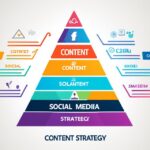Table of Contents
Ensuring that your content strategy is aligned with your business goals is essential for driving growth and sustaining a competitive advantage. By strategically aligning your content with your overarching objectives, you can effectively increase visibility, attract the right audience, and drive conversions. In this article, we will explore the importance of aligning content with business goals and delve into the steps to achieve this alignment successfully.
Defining Content Strategy
Content strategy involves creating, managing, and distributing content to achieve specific goals. It requires making deliberate decisions about what content to create, who it is intended for, and how it will be delivered. A well-defined content strategy ensures that the content produced aligns with the overall objectives of the business or organization. Understanding the target audience, their needs, and the platforms used to reach them is crucial in developing an effective content strategy.
Importance of Aligning Content with Business Goals
Aligning content with business goals is crucial for the success of any organization. When content is created with the specific goals of a business in mind, it helps the company achieve its objectives effectively. By aligning content with business goals, companies can increase visibility, attract the right audience, and ultimately drive conversions.
Content that aligns with business goals serves a purpose and contributes to the overall growth and success of the business. It ensures that the content strategy is focused, targeted, and impactful. By taking a strategic approach to aligning content with business goals, organizations can optimize their messaging, allocate resources more effectively, and achieve better outcomes.
Increased Visibility and Audience Attraction
When content is aligned with business goals, it has a higher chance of gaining visibility among the target audience. By creating content that speaks directly to the needs and interests of the target audience, companies can attract and engage the right people.
“Aligning content with business goals ensures that the right message reaches the right people, at the right time.”
Driving Conversions
Content that aligns with business goals is more likely to drive conversions. By tailoring content to guide customers through the buyer’s journey, companies can provide valuable information and solutions that address customers’ pain points. This builds trust, credibility, and ultimately leads to conversions.
Strategic Resource Allocation
Aligning content with business goals allows organizations to allocate their resources more strategically. By understanding the specific goals they want to achieve, companies can prioritize their content efforts and invest their time, energy, and budget into the areas that will deliver the most significant impact and return on investment.
Table:
| Aligning Content with Business Goals | Benefits |
|---|---|
| Increased visibility | Reaching the right audience |
| Attracting the right audience | Increased engagement |
| Driving conversions | Increase in sales and revenue |
| Strategic resource allocation | Optimal use of time, energy, and budget |
Aligning content with business goals is a critical component of a successful content marketing strategy. By ensuring that every piece of content has a clear purpose and is aligned with the overall objectives of the business, companies can optimize their content efforts and drive meaningful results.
Identifying and Prioritizing Business Goals
In order to align your content strategy with your business objectives, it is crucial to first identify and prioritize your goals. This process involves defining specific objectives that your company aims to achieve. By clearly outlining your business goals, you can focus your efforts and allocate resources effectively. Having well-defined goals provides a clear direction for your content strategy, ensuring that your content efforts are in line with your overall business objectives.
When identifying your business goals, it is essential to consider what you want to accomplish and determine the key areas that require attention. This could include increasing brand awareness, driving website traffic, generating leads, or enhancing customer engagement. By prioritizing your goals, you can concentrate on the most significant areas that will have the greatest impact on your business success.
When aligning your content strategy with your business goals, it is important to keep in mind that each goal should have defined objectives. These objectives serve as specific targets that can be measured and evaluated to track your progress. Objectives should be SMART – Specific, Measurable, Achievable, Relevant, and Time-bound. This ensures that your goals are realistic and actionable, setting your content strategy up for success.
By identifying and prioritizing your business goals, you lay the foundation for a cohesive and effective content strategy. This enables you to create content that aligns with your overarching objectives and drives meaningful results for your business.
Linking Business Goals to Content Strategy
Linking business goals to content strategy is crucial for achieving success and driving desired outcomes. It involves aligning the objectives and aims of a company with the creation and management of its content to ensure maximum impact and effectiveness.
By developing a clear understanding of what the company hopes to achieve, content can be strategically used to meet specific business needs in a purposeful and cohesive manner. This alignment allows organizations to enhance their online presence, engage their target audience, and drive meaningful results.
Effective content strategy starts with defining and prioritizing business goals. Once these goals are established, they serve as the foundation for creating content that resonates with the broader business objectives. By aligning content with business goals, companies can optimize their content marketing efforts and deliver messages that directly support their objectives.
Whether the goal is to increase brand awareness, generate leads, or drive conversions, content strategy plays a crucial role in achieving these goals. By creating content that aligns with the business objectives, companies can attract the right audience, establish authority in their industry, and ultimately drive desired outcomes.
Benefits of Linking Business Goals to Content Strategy
When business goals are linked to content strategy, companies can benefit in several ways:
- Increased Online Visibility: Well-aligned content can improve a company’s online visibility, making it easier for potential customers to discover and engage with their brand.
- Targeted Audience Engagement: Content that is specifically created to align with business goals can effectively engage the company’s target audience, ensuring that the message is received by the right people.
- Enhanced Brand Reputation: By aligning content with business goals, companies can establish themselves as thought leaders in their industry, building a reputation that sets them apart from competitors.
- Improved Conversion Rates: Strategic content that aligns with business goals can drive higher conversion rates by persuading customers to take desired actions, such as making a purchase or filling out a form.
It is essential for companies to continuously evaluate and refine their content strategy to ensure it remains aligned with the evolving business goals. This involves regularly analyzing the performance of the content, measuring its effectiveness, and making necessary adjustments to optimize results.
“By aligning content with business goals, companies can optimize their content marketing efforts and deliver messages that directly support their objectives.”
By linking business goals to content strategy, companies can create a powerful and cohesive content marketing strategy that drives growth, maximizes impact, and contributes to the overall success of the business.
Conclusion
Aligning your content marketing strategy with your business objectives is essential for driving success and achieving desired outcomes. By defining and prioritizing your business goals, linking them to your content strategy, and approaching your content creation strategically, you can ensure that your content directly supports and contributes to your overall objectives.
Regular measurement and evaluation of your content’s performance are crucial to gauge its effectiveness and make necessary adjustments. By analyzing key metrics and gathering feedback from your audience, you can gain insights into what works and what doesn’t, allowing you to refine your content marketing efforts and maximize their impact.
Remember that content marketing is not just about creating and distributing content; it’s about aligning your content with your business goals. By keeping your audience’s needs and interests in mind, and consistently delivering valuable and relevant content, you can establish your brand as a trusted resource and drive meaningful engagement with your target audience.
FAQ
What is content strategy?
Content strategy involves creating, managing, and distributing content to achieve specific goals. It requires making deliberate decisions about what content to create, who it is intended for, and how it will be delivered.
Why is aligning content with business goals important?
Aligning content with business goals is crucial for success. When content is created with the specific goals of a business in mind, it helps the company achieve its objectives effectively. Content that aligns with business goals can increase visibility, attract the right audience, and drive conversions.
How can I identify and prioritize my business goals?
Identifying and prioritizing business goals involves defining specific objectives that a company wants to achieve. This process enables businesses to focus on what is most important and allocate their efforts and resources accordingly.
What does it mean to link business goals to content strategy?
Linking business goals to content strategy means aligning the objectives and aims of a company with the creation and management of its content. It involves developing a clear understanding of what the company hopes to achieve and how content can support those goals.
Why should I align my content strategy with my business goals?
Aligning your content strategy with your business goals is crucial for driving success and achieving desired outcomes. By defining and prioritizing business goals, linking them to your content strategy, and taking a strategic approach, you can create content that directly supports and contributes to your business objectives.
How should I measure the performance of my content?
It is important to measure and evaluate the performance of your content regularly to ensure its effectiveness and make necessary adjustments. By aligning your content with your business goals, you can optimize your content marketing efforts and maximize their impact.













